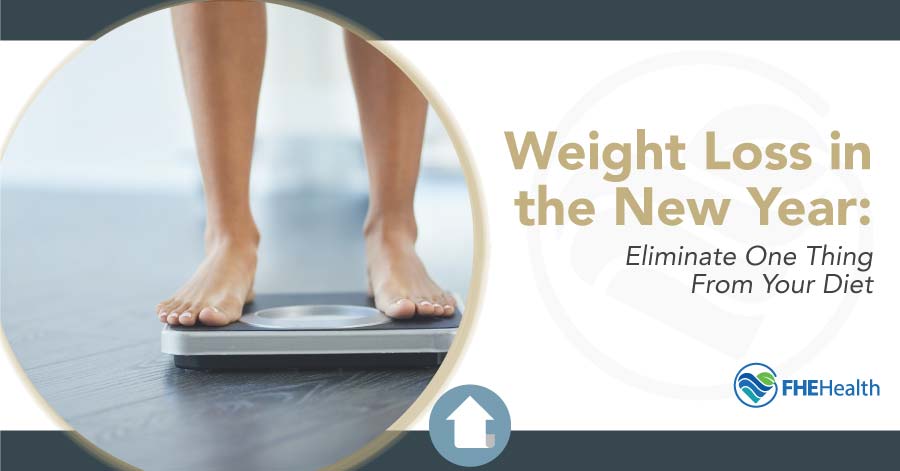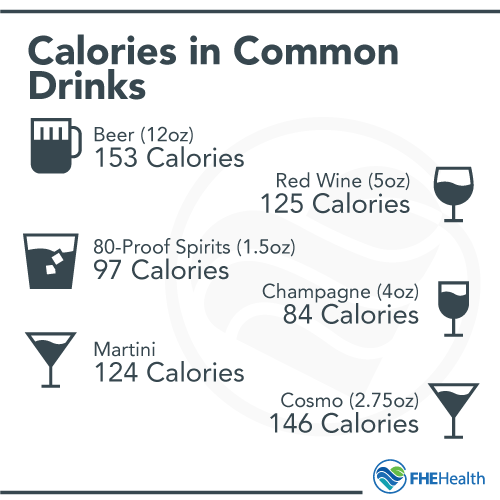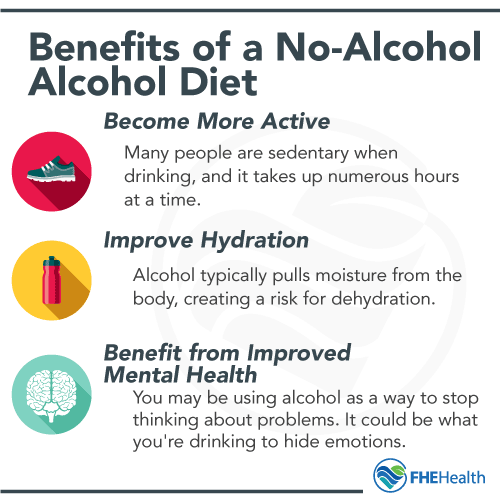
It’s that time of the year again, when you’re setting New Year’s goals. This year, you may once again try to lose weight. While that is a good thing to do, it’s important to think about why you may not have succeeded in the past.
For some people, alcohol and weight loss go hand-in-hand. That is, giving up alcohol may lead to weight loss.
How Many Calories Are You Drinking?
 It’s not uncommon to pick up a drink here and there without considering what’s in it. Because it’s liquid doesn’t mean you’re not getting calories. Does alcohol put on weight? It can, depending on how much you drink.
It’s not uncommon to pick up a drink here and there without considering what’s in it. Because it’s liquid doesn’t mean you’re not getting calories. Does alcohol put on weight? It can, depending on how much you drink.
Take into consideration a few examples based on insight from the U.S. National Library of Medicine:
- The average regular beer has about 153 calories in a 12-ounce drink. Even a light beer has 103 calories. Some craft beers have as many as 350 calories.
- A 1.5-ounce drink of rum gives you about 197 calories, while vodka, gin, and whiskey have about 116.
- Perhaps you like mixed drinks. A mai tai has about 306 calories in 4.9 ounces. A tequila sunrise has about 232. A white Russian offers 568, while a chocolate martini packs in 341 calories in 2.5 ounces.
Most people don’t treat the calories they consume in alcoholic drinks as calories they count on a diet, but they can certainly add up, especially if you consume them frequently or in combinations. Even ardent calorie counters who use apps are prone to forget to enter drinks into their programs. Cutting them out of your diet may help you to reach your weight loss goals faster, and, often, in a better manner.
What Could a No-Alcohol Weight Loss Program Do for You?
 How much does alcohol affect weight gain? To consider this, think about what may happen if you decide to ditch alcohol in the new year. If your lifestyle includes a significant amount of drinking, such as more than a few drinks a week, that could be impacting your overall health as well.
How much does alcohol affect weight gain? To consider this, think about what may happen if you decide to ditch alcohol in the new year. If your lifestyle includes a significant amount of drinking, such as more than a few drinks a week, that could be impacting your overall health as well.
Become More Active
When you lose the alcohol, you may find yourself more active. Many people are sedentary when drinking, and it takes up numerous hours at a time.
When you get rid of it, though, you open the door for new activities. Try replacing drinking with activities that you like so you don’t feel as though you’re missing out.
Improve Hydration
You’ll be better hydrated. Alcohol typically pulls moisture from the body, creating a risk for dehydration.
Also, when you drink alcohol, you’re missing key opportunities to drink water. Hydration improves your overall health, flushes away toxins in your cells and can help you lose weight.
Benefit from Improved Mental Health
Improved mental health is another key advantage of getting rid of alcohol. You may be using alcohol as a way to stop thinking about problems. It could be what you’re drinking to hide emotions.
Dealing with those emotions is healthier for you. That alone can give you the motivation and self-esteem you need.
An alcohol-free lifestyle provides you with an advantage in terms of mental health. Most people don’t realize that routine use of alcohol can create dependency.
This type of addiction can also worsen underlying mental health concerns. The result of not drinking is that you’re benefiting in the long term from improved mental health.
Try This Change in the New Year
The health benefits of getting rid of alcohol are numerous. It sounds good and like a sure-fire plan, but how do you make it work? Consider a few tricks to improve the odds of seeing weight loss success.
Make It a Group Effort
Whether you pair up with a friend, loop in your office friends or just work with a spouse, don’t do it alone. Convincing others to stop drinking is not always easy, though. Explain why you want to give it a try.
Then, create a goal to reach as a group or individually. Incorporate a prize for the winner of a contest. No matter what you do, by having someone to keep you honest, you’ll be more successful.
Create a Visual Representation
Acknowledge your landmarks throughout this process. Record what you weigh now and what your typical week looks like with alcohol consumption.
Then focus on tracking your goals. As you see the pounds come off, be sure to appreciate your little victories.
Replace Alcohol with Good Things You Love
The key trick to giving up alcohol is to recognize that, right now, it’s filling a need for you. Replace that with something else that makes you happy or keeps your active. Consider ideas such as:
- Start going to the rec center to swim each morning. You’ll appreciate your body more later in the day.
- Instead of going to the bar after work, head to a park to do some walking.
- Start a new hobby that gets you some exercise and draws your attention away from the fact you’re not drinking.
The key is to fill your time so you don’t want to drink, but also to replace it with something you know you’ll love even more. Doing this encourages long-term resistance to drinking. When you make this change in the new year, you’ll have a refreshed perspective on your life and your health as a whole.
Are You Having Trouble Cutting Out Alcohol?
If you find you can’t cut out alcohol, or you’re having some side effects from doing so, that may mean that you have an alcohol dependency. If that’s the case, it’s more important than ever to seek help for your alcohol use. Here are a few symptoms to consider:
- Do you think about getting a drink every day or so?
- Are you unable to resist having a beer or two a day?
- Do you find yourself irritable and moody without it?
- Are you feeling poorly, perhaps with aches and pains?
- Are you struggling with headaches suddenly?
If this is happening, or any other symptoms occur, alcohol addiction is something you should speak to a therapist about soon. While it may seem harmless right now, it’s more than just weight that’s impacted.
Having a dependency on alcohol is nothing to be ashamed of or something to hide. It means that this is an opportunity for you to seek help for the underlying problem. You can recover from it.
Let FHE Health Help You Recover
If you’re struggling with giving up alcohol, it’s time to seek help. Contact our team at FHE Health to learn more about dependency and whether you could be at risk. Speak to our compassionate counselors when you call (833) 596-3502.






